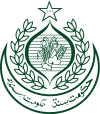Related Research Articles

Sukkur is a city in the Pakistani province of Sindh along the western bank of the Indus River,directly across from the historic city of Rohri. Sukkur is the third largest city in Sindh after Karachi and Hyderabad,and 14th largest city of Pakistan by population. The city was originally founded by the Rai dynasty of Sindh. The modern city was built in the 1840s. New Sukkur was established during the British era alongside the village of Sukkur. Sukkur's hill,along with the hill on the river island of Bukkur,form what is sometimes considered the "Gate of Sindh".
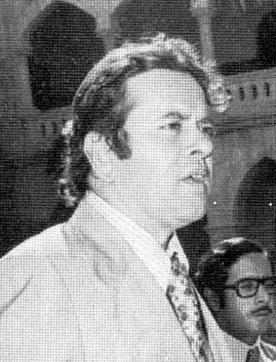
Abdul Hafeez Pirzada was a Pakistani lawyer,legal theorist,and politician,who served variously as minister for information,minister for law,minister for finance,and minister for education under president and later prime minister Zulfikar Ali Bhutto from 1971 to 1977. As law minister,he is credited as a principal draftsman of the Constitution of Pakistan,passed in 1973.
Syed Ghous Ali Shah is a Pakistani politician and jurist. He was Chief Minister of Sindh,Pakistan from 1985–1988.
Mumtaz Ali Khan Bhutto,was a Pakistani politician who served as 8th Governor of Sindh and later the 13th Chief Minister of Sindh. He was also the first cousin of late Zulfiqar Ali Bhutto,who was the Prime Minister of Pakistan from 1973 to 1977.
Muhammad Ibrahim Joyo was a Pakistani teacher,writer,scholar and Sindhi nationalist.
Sindhi Adabi Board is a government sponsored institution in Pakistan for the promotion of Sindhi literature. It was established in 1955 in Jamshoro,Sindh. It is under the Education Department of the Government of Sindh.

The Law Minister of Pakistan heads the Ministry of Law and Justice. They serves in the cabinet of the Prime Minister.
Sir Ghulam Hussain Hidayatullah KCSI was a colonial Indian and Pakistani politician from Sindh. He held several offices in Sindh including 1st Chief Minister (1937–1938) and being re-elected as 5th Chief Minister (1942–1947).
Allah Bux Muhammad Umar Soomro,or Allah Baksh Soomro,was a zamindar,government contractor,Indian independence activist and politician from the province of Sindh in colonial India. He is considered to be amongst the best premiers of the province,known for promoting Hindu-Muslim unity and campaigning for an independent,united India. He was referred to as Shaheed or "martyr".
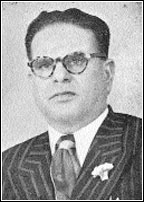
Muhammad Hashim Gazdar was one of the three representatives from Sindh to the Constituent Assembly of Pakistan,and the second Deputy Speaker of the National Assembly of Pakistan.
Imdad Hussaini was a Pakistani Sindhi poet and an Urdu language writer.

Syed Miran Mohammad Shah [(Sindhi:سيدميرانمحمدشاھ),19 March 1898 - 16 November 1963] was the second speaker of the Sindh Assembly before and after the independence of Pakistan. He was a Sindh member in the Bombay Legislative Assembly before Sindh became a province in 1936. After the accession of Sindh to Pakistan in 1947,he became the first speaker of the Sindh Assembly. He remained speaker of Sindh Legislative Assembly and Minister for the Government of Sindh. Miran Mohammad Shah also served as the first ambassador of Pakistan to Spain after the independence of Pakistan.
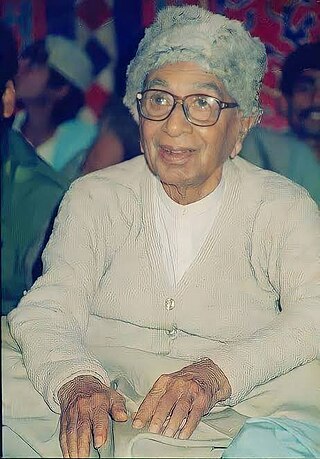
Ghulam Murtaza Syed,known as G. M. Syed was a prominent Sindhi politician,who is known for his scholarly work,passing only constitutional resolution in favor of the establishment of Pakistan from British India's Sindh Assembly in 1943. Later proposing ideological groundwork for separate Sindhi identity and laying the foundations of Sindhudesh movement. He is regarded as one of the founding fathers of modern Sindhi nationalism.
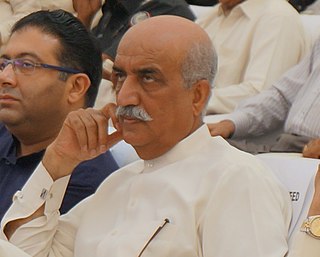
Syed Khurshid Ahmed Shah (Urdu,Sindhi:سیدخورشیداحمدشاہ;born 13 November 1954 is a Pakistani politician and lawyer who has been a member of the National Assembly of Pakistan since February 2024 and previously served in this position from August 2018 till August 2023 and between 1990 and May 2018.
Ghulam Rabbani Agro is a prominent name of Sindhi literature. He is the pioneer of revised-era of Sindhi short story in post-partition era. His literary career though started with Sindhi short story took many turns whereby he contributed a number of literary and scholarly articles on varied topics including history of Sindhi language,culture,religion,biographies of prominent personalities,and many more.
Ghulam Muhammad Khan Bhurgri (Barrister),(1878-1924) was a Sindhi statesman.

Syed Murad Ali Shah is a Pakistani politician and structural engineer who is currently serving as the Chief Minister of Sindh province of Pakistan and a member of the Sindh Assembly. It is his third term as Chief minister. Shah earlier held portfolios such as Minister of Irrigation of Sindh and Finance Minister of Sindh.
Khan Bahadur Muhammad Siddique Memon was an educationist,writer and social leader of Hyderabad,Sindh,Pakistan. He established "Madrasatul Banat" the first school of Sindhi Muslim girls in Hyderabad. He was founder of Sindhi Muslim Literary Society and Sindhi Muslim Printing Press. He authored more than 15 books including some text books. He served as Principal of Training College for Men,Hyderabad from 1940 to 1947. He was bestowed upon with the title of Khan Sahib and Khan Bahadur by the Viceroy of British India.
Syed Ghulam Mustafa Shah [(Sindhi:سيدغلاممصطفيٰشاھ),18 October 1918 - 09 October 1999] was a scholar,educationist and academic leader from Sindh,Pakistan. He served as Vice Chancellor of Sindh University Jamshoro and Federal Education Minister of Pakistan. He was founder of "Shah Abdul Latif Cultural Society" and launched the scholarly Journal "Sindh Quarterly".
Lalchand Amardinomal Jagtiani was a story writer,novelist and essayist healing from Hyderabad,Sindh,British India. Throughout his prolific career,he penned a remarkable total of 62 books,encompassing diverse genres such as one-act plays,short stories,literary criticism,and scholarly articles.
References
- ↑ "Sindh politics again in the throes of uncertainty". DAWN.COM. 3 March 2005.
- ↑ Ghani, Faras. "The Crisis Engulfing the Pakistan Cricket Board". Bleacher Report.
- 1 2 3 "پيرزادو عبدالستار : (Sindhianaسنڌيانا)". www.encyclopediasindhiana.org (in Sindhi). Retrieved 4 May 2022.
- ↑ "Legislative Assembly of Sindh Under Government of India Act 1935. (First Assembly: 27 April 1937 to 1945)" (PDF). Retrieved 5 May 2022.
- ↑ Syed, G.M. (1967). Janab Guzarium Jen Seen (in Sindhi). Jamshoro, Sindh, Pakistan: Sindhi Adabi Board.
- ↑ Syed, G.M. (1985). "Abdul Sattar Pirzado". Mehran. 1–2 (34). Sindhi Adabi Board: 29.
- ↑ InpaperMagazine, From (16 October 2011). "Flashback: One Unit: a dark chapter in our history". DAWN.COM. Retrieved 5 May 2022.
